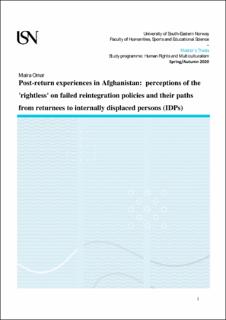Post-return experiences in Afghanistan: perceptions of the 'rightless' on failed reintegration policies and their paths from returnees to internally displaced persons (IDPs)
Master thesis
Permanent lenke
https://hdl.handle.net/11250/2673626Utgivelsesdato
2020Metadata
Vis full innførselSamlinger
Sammendrag
States in 2001 became stricter and forced Afghan refugees to return to their country of origin. These returnees face various barriers in their reintegration to the political community. This study explores the post-return experiences of returnees, the challenges in their repatriation and identifies the main challenges, roles and responsibilities of local and international actors in current reintegration policies in Afghanistan. This research conducts a theoretical thematic analysis on semi-structured interviews with Afghan returnees and NGO employees to generate themes relating to the concept of bare life (Agamben), the right to have rights (Arendt), humanitarian reason (Fassin) and border crossing (Hyndman). The themes deduced include: the lack of autonomy and human rights, broken families and bare life of shame and rightlessness and the power of governments; international agencies and NGOs provide awareness to the post-return experiences in Afghanistan and the return policies of host countries. The study indicates that perceptions of the 'rightless' on failed reintegration policies and their paths from returnees to IDPs is a result of European governments’ migration policies and the low capacity not only of the Afghan government, but also of international agencies to assist returnees in Afghanistan
